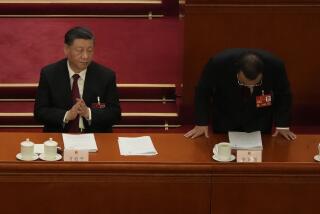TOWARD A NEW ASIAN ORDER : A WORLD REPORT SPECIAL SECTION : Paramount Beijing Leader Retains His Faith in Force
- Share via
BEIJING — “Whether a cat is black or white makes no difference,” Deng Xiaoping declared 30 years ago in the most famous statement of his long career. “As long as it catches mice, it is a good cat.”
Deng was making the case for economic reform during a brief period of political calm in the early 1960s. China was then recovering from the disastrous Great Leap Forward of the late 1950s and had not yet fallen into the chaos of the 1966-1976 Cultural Revolution.
Chairman Mao Tse-tung, who favored a politicized approach to problem-solving, recognized Deng’s brilliance but sometimes could not bear his stubbornly non-ideological views. Twice during the final decade of his life, the Great Helmsman cast Deng from power as a suspected capitalist-roader.
Deng rebounded quickly after Mao’s 1976 death, assuming de facto top leadership in late 1978. A broad network of military and political ties, built up during a lifetime of high-level service to the Communist cause, formed the base of Deng’s power.
Under Deng, the Communist Party quickly laid down the fundamental policies it has followed for the past 14 years, summed up in the slogan “One Center; Two Basic Points.” The “center” is to focus on economic development as the country’s main task. The “two basic points,” viewed as the means to achieve this goal, are market-oriented reforms and opening to the outside world on one hand and unyielding dictatorship by the Communist Party on the other.
In Deng’s mind, economic reform and political dictatorship are inextricably linked. He himself seems to believe that this is the right solution for China, on grounds that only unchallenged Communist rule can provide the stability needed for economic modernization and growth.
Deng’s formula is also the glue that holds together a fractious ruling party. It gives radical reformers hope that economic change may someday bring political liberalization, while it also reassures elderly hard-liners that the party will not be overthrown during their lifetimes.
It is a formula well-understood in East Asia, with a tradition of economic success under authoritarian regimes. While socialism continues to make China different from its capitalist neighbors, Deng’s ideas have made China far less different than it was under Mao. Authoritarian rule and a focus on the economy are historically familiar policies, even if they are not necessarily followed anymore, in every country from Japan to Indonesia.
Casual Western observers of China, on the other hand, have often had trouble realizing that Deng and his colleagues are serious about both economic reform and political dictatorship. Many Westerners--and some Chinese intellectuals--believe these two policies cannot be be reconciled.
Whether an advanced economy and a one-party dictatorship can ultimately coexist is not, however, the key point. What matters in policy terms is that China’s ruling party, under Deng’s leadership, decided in 1978 that at least for this period of China’s initial modernization, they not only can, but must.
Deng initially consolidated his position in 1978-79 by permitting the flowering of “Democracy Wall” in Beijing, not far from Tian An Men Square. Posters that were freely displayed here lambasted Deng’s enemies in an upsurge of anger over Maoist abuses.
Relations with the United States were normalized Jan. 1, 1979, and Deng quickly made a flashy U.S. tour, winning the hearts of Americans when he donned a cowboy hat at a Texas rodeo.
By the time he returned to China, Deng had branded a deeply positive image of himself on the U.S. consciousness, one that would survive until the Beijing massacre of June 4, 1989, when it was finally shattered on the bloodstained streets of the Chinese capital.
Yet Deng’s willingness to use force to end the Tian An Men Square pro-democracy protests reflected traits that were visible throughout his career.
Deng played an important military role in the Communists’ 1949 victory in China’s civil war. In 1957, as the party’s general secretary, he spearheaded an “anti-rightist” campaign that sent tens of thousands of intellectuals to jail or rural exile. In 1979, after “Democracy Wall” had helped him defeat his rivals, he shut it down and sent the most famous democratic activist of that period, Wei Jingsheng, to jail.
But Deng’s policies have brought solid economic growth and laid the groundwork for hopes of a better future. This spring he launched a new publicity drive to press for an acceleration of economic reform. As part of that effort, he launched verbal attacks against excessive “leftism”--in effect turning against hard-line colleagues who had helped him reimpose party control after the turmoil of 1989.
It was vintage Deng.
“I am the sort of person who does not get discouraged easily,” Deng said more than a decade ago. “I am an optimist and I know what politics is like. . . . I am a layman in other fields, but I do know something about fighting.”
More to Read
Sign up for Essential California
The most important California stories and recommendations in your inbox every morning.
You may occasionally receive promotional content from the Los Angeles Times.













